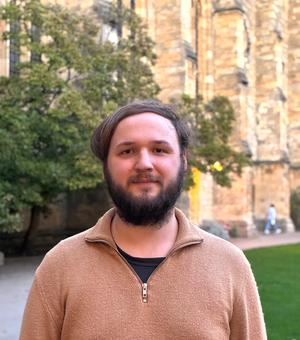Oliver Haythorne
DPhil Research Topic
Information-gathering and the political economy of the Holy Roman Empire, 1556–1613
Supervisors: Peter Wilson and Eric Chaney
Acquiring reliable information and intelligence in the early modern Holy Roman Empire of the German Nation was no easy task. Understanding the situation on the ground is vital for effective governance and political strategy in any political entity, yet for early moderns getting the very basics could be a serious challenge. The media environment was full of rumour and sensationalist reporting that bordered on the fictitious, and there was no single body dedicated to gathering information. The modern administrative state, with its permanent civil servants and statistical bureaux, did not yet exist, and the "information state" some historians see forming in England and the Netherlands did not take root in German soil. I aim to understand how the Holy Roman Emperors between the accession of Ferdinand I (r. 1556–1564) and the breakdown of the Reichstag in 1613 got, understood, and used information. More broadly, I am investigating how information did - or didn't - structure the Empire's politics in this vital period between the Peace of Augsburg and the destructive Thirty Years' War.
Scholars such as Katrin Keller, Michael North, and Dietmar Heil have influentially portrayed the Empire of the sixteenth century as a realm of communication and dialogue, centred around the Reichstag, or Imperial Diet, as its "politisches Kommunikationszentrum" (political communication centre). I am interested in the question of how far this communication conveyed information to the Emperor and princes of the Empire in the autumn and winter years of that vernal century. Confessionalization and the hardening of religious boundaries surely impacted the ways and degree to which communications were information-bearing, as different confessional blocs developed distinct political discourses, rituals, and alliances. Allied to this question is that of the rise of "private" intelligence-gathering efforts through increasingly regularized diplomatic contacts, espionage, and the Imperial Commissions. Confessional politics and the process of early modern state-building increased the utility of such focussed means of getting information, since they could be targeted to particular issues and partly bypassed the need to negotiate with other parties. However, such efforts still had their pitfalls and difficulties. I hope to clarify how private information-gathering worked in the Empire, and how it interacted with with the "public" mechanism of the Reichstag. In general, I endeavour to fill a gap in our understanding of how the Empire functioned as a political unit in which agents could act freely, not frozen by uncertainty.
I read for my BA in History at Corpus Christi College, Oxford, graduating with a Gibbs Book Prize for outstanding finals results, before moving to New College for the MSc in Economic and Social History. It is at New College I have stayed for my DPhil. I work in the chapel there as a verger on Thursdays in termtime. I am very fortunate to be funded by the ESRC.
My research interests, put most broadly, are:
- The political, military, social, and economic history of the Holy Roman Empire from 1493 to 1657
- Information-gathering and intelligence in early modern state formation
- The intersection of political science and history
- The life of Emperor Rudolf II (r. 1576–1612)
Alongside these research interests, I am interested in the theology of the Magisterial Reformation (especially Anglican), Elizabethan and Jacobean poetry, textual criticism of the Gospel of John, Moche archaeology, the English Civil War, and China in the Five Dynasties, Ten Kingdoms period. Feel free to contact me at any of the below social media:
LinkedIn: https://www.linkedin.com/in/oliver-haythorne-335227221/; Twitter: @joseph_rohrbach; Bluesky: @josephrohrbach.bsky.social




